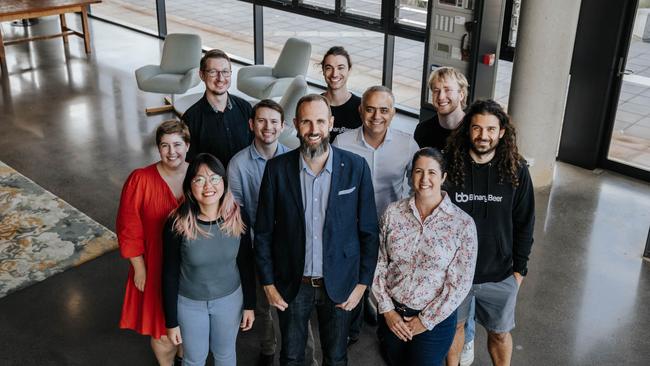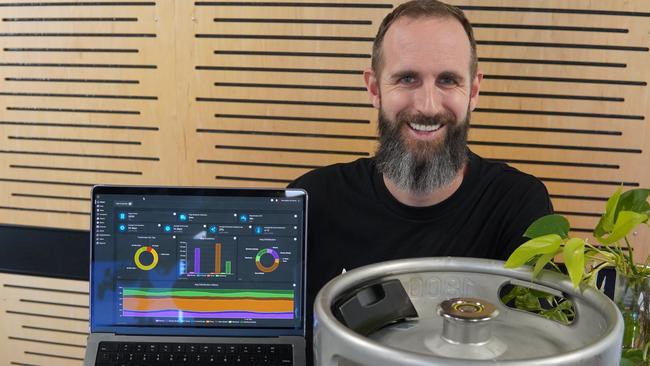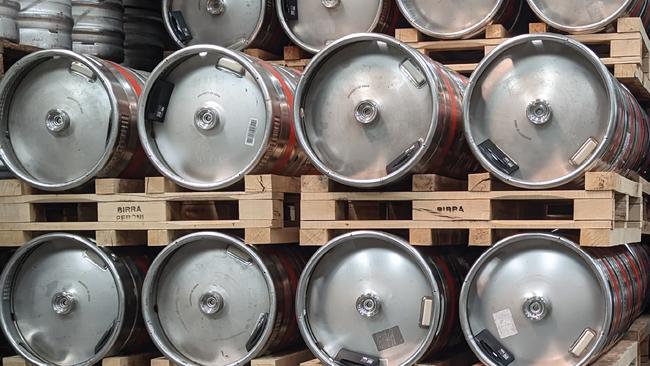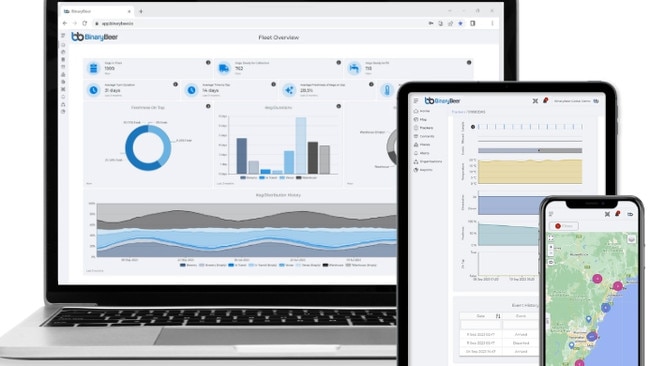Meet the Wollongong start-up using AI and keg tech to keep Japanese beer cold in Europe
A Wollongong start-up whose technology monitors beer from the brewery to the tap has landed a big deal to keep Japanese beer cold in Europe.

If beer kegs could talk, they’d tell some rather vivid stories, says Michael Burton, the chief executive of a small Australian start-up which has scaled its beer keg sensors across Europe.
While most kegs are built to last about 25 years, he said, some have been in operation for far longer, and his start-up’s technology – called KegLink – cannot only track a keg’s location but its temperature and whether exposure to certain conditions can make a beer turn sour.
BinaryBeer, which uses an internet of things (IoT) style technology to track kegs, this month landed a partnership with one of the world’s largest beverage companies, Japanese multinational Asahi.
Under BinaryBeer’s deal it will track 1000 Asahi kegs across Europe, monitoring their temperature, location and any damage along their tracks from the brewery to the bar.
“It’s been great for us to be working with Asahi Europe which has one of the largest fleets of beer kegs on the planet,” Mr Burton told The Weekend Australian.

“It shows us that what we’re tackling is not just a local problem, it’s a global issue anywhere that draught beer is being served over long distances or through challenging supply chains.”
The idea behind BinaryBeer began back in 2016 when Mr Burton had a grand plan to make beer kegs smart.
“We had this vision of connecting all of the world’s beer kegs to the internet which was kind of crazy at the time,” he said.
“With these new technologies, it’s kind of the dawn of what we call massive IoT where not just everyone but everything can be connected to the internet.”
With a background in technology and robotics, Mr Burton said he was just grateful he was in a position where he was able to see the trend coming and understood how it worked.
“I saw this opportunity where we had this hugely scalable market with draught beer with millions of beer kegs rolling down conveyor belts numerous times a year to be filled with beer,” he said.

While the average keg costs between $150 to $200 to make and carries about $200 worth of wholesale-priced beer, their long lifespan is what is most important. And Australians have some out-there ideas on how to make use of old kegs as well as those left out the back of a bar for too long, Mr Burton said.
“Australians can be really creative in the way that they use old beer kegs as well … (but there’s this idea that) if something sits around for a long time, it becomes fair game,” he said.
“They can be turned into a backyard burner or a urinal or anything, we can be quite industrious with what we turn them into. That was kind of one of the very early things that sparked the idea for BinaryBeer so that we could make sure that kegs don’t sit around idle, grow legs and disappear.”
While BinaryBeer can see the live location of a keg using a sensor, it wasn’t in the business of going out to collect them.
“A lot of brewers actually trawl through Gumtree and eBay looking for their kegs when they go missing. It’s so heartbreaking to see that when it happens, especially when there’s a shiny new fleet of kegs being sent out for the first time,” he said.
Locally, BinaryBeer works with Five Barrel Brewing to track each and every one of its kegs and runs trials with Carlton & United Brewing.

As for how the technology works, each keg is fitted with a single KegLink device which contains several sensors, including a thermometer, an accelerometer and a sensor which uses an infra-red laser beam.
“It’s like a tape measure which uses a beam to reflect off the coupler on the beer keg so we can understand the very moment when a beer is put on tap and the moment that it’s taken off tap,” Mr Burton said.
That data is then transmitted over a 5G network through its network partner TPG. 5G, Mr Burton said, has allowed the transfer of data to be faster and require less battery power.
The battery life of KegLink sensors can now last up to 10 years without needing to be charged.







To join the conversation, please log in. Don't have an account? Register
Join the conversation, you are commenting as Logout